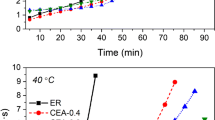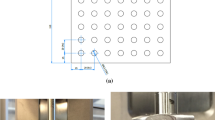Abstract
A new hot mixed epoxy asphalt system was developed. The reaction process of epoxy resin was characterized by Fourier transform infrared spectroscopy (FTIR). The viscosity was investigated by Brinell viscometer when epoxy resin was mixed with asphalt. The glass transition temperature (Tg), homogeneity, thermal stability and viscoelasticity of epoxy asphalt were analyzed by differential scanning calorimetry (DSC), metallographic microscope, thermogravimetric (TG) and dynamic mechanical analysis (DMA). The results showed that the viscosity of epoxy resin modified asphalt reached 1 000 mPa·s for more than 180 minutes at 180 °C, while the best construction process is mixing at 180 °C for 2 hours and curing at 60 °C for 4 days. The particle size of asphalt is less than 50 µm. In addition, the mechanical properties of the materials are uniform within the specified pavement thickness.
Similar content being viewed by others
References
Huang W, Qian Z, Chen G, et al. Epoxy Asphalt Concrete Paving on the Deck of Long-Span Steel Bridges[J]. Sci. Bull., 2003, 48(21): 2 391–2 394
Zhu C. Japan TAF Epoxy Asphalt Concrete Design and Steel Bridge Deck Pavement Construction Technology[J]. Appl. Mech. and Mater., 2013, 330: 905–910
Qian Z, Chen L, Jiang C, et al. Performance Evaluation of a Lightweight Epoxy Asphalt Mixture for Bascule Bridge Pavements[J]. Constr. Build. Mater., 2011, 25(7): 3 117–3 122
Chen L, Qian Z, Hu H. Epoxy Asphalt Concrete Protective Course Used on Steel Railway Bridge[J]. Constr. Build. Mater., 2013, 41(Complete): 125–130
Zhang L, Greenfield M L. Effects of Polymer Modification on Properties and Microstructure of Model Asphalt Systems[J]. Energy Fuels, 2008, 22(5): 3 363–3 337
Cong P, Chen S, Yu J. Investigation of the Properties of Epoxy Resin-Modified Asphalt Mixtures for Application to Orthotropic Bridge Decks[J]. J. Appl. Polym. Sci., 2011, 121(4): 2 310–2 316
Yin H, Zhang Y, Sun Y, et al. Performance of Hot Mix Epoxy Asphalt Binder and Its Concrete[J]. Mater. Struct., 2015, 48(11): 3 825–3 835
Gomezmeijide B, Perez I P A. Proposed Methodology for the Global Study of the Mechanical Properties of Cold Asphalt Mixtures[J]. Mater. Des., 2014, 57: 520–527
Kongkitkul W, Musika N, Tongnuapad C, et al. Anisotropy in Compressive Strength and Elastic Stiffness of Normal and Polymer-Modified Asphalts[J]. Soild. Found., 2014, 54(2): 94–108
Cong P, Yu J, Chen S. Effects of Epoxy Resin Contents on the Rheological Properties of Epoxy-Asphalt Blends[J]. J. Appl. Polym. Sci., 2010, 118(6): 3 678–3 684
Luo S, Qian Z. Research on Low Temperature Performance of Epoxy Asphalt Mixture[J]. Appl. Mech. Mater., 2010, 34(35): 1 124–1 128
Cubuk M, Guru M, Cubuk M K. Improvement of Bitumen Performance with Epoxy Resin[J]. Fuel., 2009, 88(7): 1 324–1 328
Cong P, Liu N, Shang H, et al. Rheological and Fatigue Properties of Epoxy Asphalt Binder[J]. Int. J. Pavement Res. Technol., 2015, 8(5): 370–376
Zhang J, Yang F, Pei J, et al. Viscosity-Temperature Characteristics of Warm Mix Asphalt Binder with Sasobit®[J]. Constr. Build. Mater., 2015, 8: 34–39
Sun Y, Zhang Y, Xu K, et al. Thermal, Mechanical Properties and Low-Temperature Performance of Fibrous Nanoclay-Reinforced Epoxy Asphalt Composites and Their Concretes[J]. J. Appl. Polym. Sci., 2014, 132: (12): 1–9
Yu J, Cong P, Wu S. Laboratory Investigation of the Properties of Asphalt Modified with Epoxy Resin[J]. J. Appl. Polym. Sci., 2009, 113(6): 3 557–3 563
Yin H, Jin H, Wang C, et al. Thermal, Damping and Mechanical Properties of Thermosetting Epoxy-Modified Asphalts[J]. J. Therm. Anal. Calorim., 2014, 115(2): 1 073–1 080
Kang Y, Wu Q, Jin R, et al. Rubber-Like Quasi-Thermosetting Polyetheramine-Cured Epoxy Asphalt Composites Capable of Being Opened to Traffic Immediately[J]. Sci. Rep., 2016, 6(1): 18 882–18 882
Cong P, Tian Y, Liu N, et al. Investigation of Epoxy-Resin-Modified Asphalt Binder[J]. J. Appl. Polym. Sci., 2016, 133(21): 1–8
Gong J, Liu Y, Wang Q, et al. Performance Evaluation of Warm Mix Asphalt Additive Modified Epoxy Asphalt Rubber[J]. Constr. Build. Mater., 2019, 204: 288–295
Jamshidi H, Akbari R, Beheshty M H. Toughening of Dicyandiamide-Cured DGEBA-Based Epoxy Resins Using Flexible Diamine[J]. Iran. Polym. J., 2015, 24(5): 399–410
Gonis J, Simon G P, Cook W D. Cure Properties of Epoxies with Varying Chain Length as Studied by DSC[J]. J. Appl. Polym. Sci., 1999, 72(11): 1 479–1 488
Cong P, Chen S, Yu J, et al. Compatibility and Mechanical Properties of Epoxy Resin Modified Asphalt Binders[J]. Int. J. Pavement. Res. Technol., 2011, 4(2): 118–123
Author information
Authors and Affiliations
Corresponding author
Additional information
Funded by the Fundamental Research Funds for the Central Universities (No. 195201039), and National Science Foundation of China (Nos. 51472189 and 51373129)
Rights and permissions
About this article
Cite this article
Li, H., Wei, W., Zhang, C. et al. Hot Mixing Behavior and Curing Process of Epoxy Asphalt. J. Wuhan Univ. Technol.-Mat. Sci. Edit. 35, 605–610 (2020). https://doi.org/10.1007/s11595-020-2297-2
Received:
Accepted:
Published:
Issue Date:
DOI: https://doi.org/10.1007/s11595-020-2297-2




